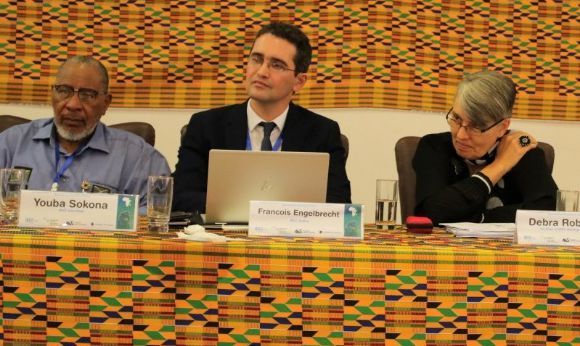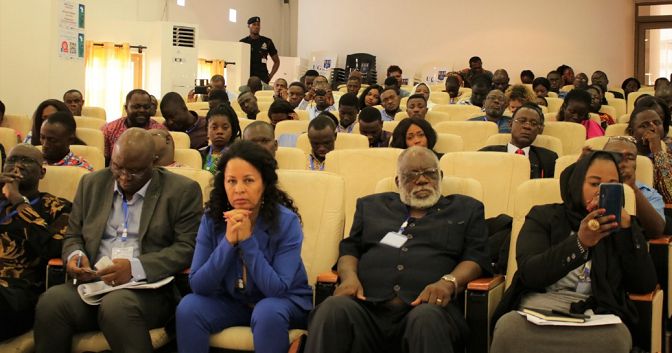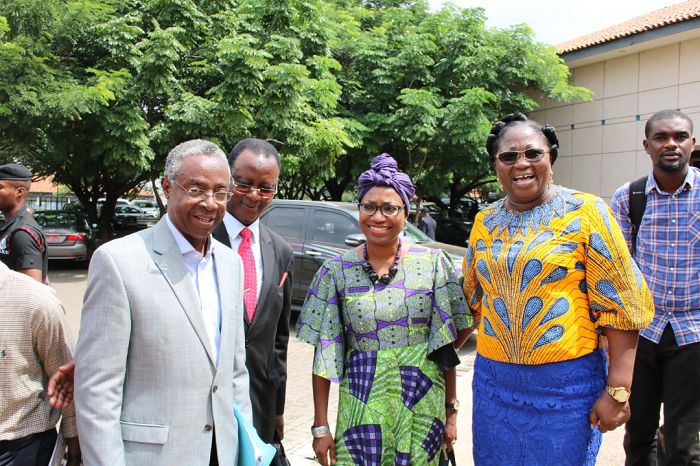
Research more into Climate Change – Climatologist to African scientists
African scientists have been urged to continue to research more into Climate Change in order to inform adaptation actions to policy makers and leaders on the continent.
Professor Francois Engelbrecht, a Climatologist and an Author of the Intergovernmental Panel on Climate Change (IPCC) Special Report on Global Warning of 1.5ºC, said Africa is the most vulnerable continent to climate change effects.
Advertisement
According to him, African countries needed to collaborate in terms of sharing climate science data, explaining that African scientists on the various parts of the continent needed to have a data sharing policy so that research works conducted by other African scientists on the continent on climate could be easily accessed by others.
Prof. Engelbrecht, who was speaking in an interview with Graphic Online after the opening of a two-day IPCC Outreach event on the 1.5 degrees Report held at the University of Ghana Law School on Thursday, July 25, this year, said climate science research in Africa could be boosted when scientists on the continent could freely access data by other African scientists on the continent.
The Intergovernmental Panel on Climate Change (IPCC) is the United Nations body for assessing the science related to climate change.
The IPCC was created to provide policymakers with regular scientific assessments on climate change, its implications and potential future risks, as well as to put forward adaptation and mitigation options.

A section of the participants
Prof. Engelbrecht expressed worry that many scientists and students on the continent could not access data by others, a situation he described hampers research work on climate on the continent.
He also called for more investment in observational networks on the continent, saying that the continent needed more weather stations that could accurately measure the continent's weather and other climate related issues.
He was of the view that there were not enough weather stations in Africa to measure the weather to determine what was happening to the continent’s climate.
Prof. Engelbrecht said the African continent also needed to build capacity of its scientists to be able to make accurate projections of the continent’s future climate change.
“We need big data server to store the data and we need super computers to be able to generate the projections,” he stated.
According to him, African climate change researchers were fraught by the lack of the tools they needed to conduct their research.
He added that because African climate change researchers lacked the tools to conduct their research, the continent relied mainly on Europeans, Latin America, Chinese and Indian climate stations to obtain data on the continent’s climate.
“We need to develop our own data servers on the continent,” he said, pointing out that “we must invest in connectivity.”
“We need very fast speed data connections; high speed fibre cables between African countries; and between African countries and US, Europe and Asia so that we can much more effectively share data,” Prof. Engelbrecht.
According to him, the best way for African to improve on its climate change research was to build a strong data infrastructure, stressing that “the choice we make will create the difference in the climate change effort” and that “it is still not too late to change our future.”
Dr Debra Roberts, Co-Chair of IPCC Working Group II, said three to 16 million people globally would be pushed to extreme poverty if nothing was done to change the world’s climate, adding that three billion people were also likely to live in slums by 2050 due to the effects of climate change.
The Director of the United Nations University Institute for Natural Resources in Africa (UNU-INRA), Dr Fatima Denton, said the 1.5 degrees report “is about recognizing that the window opportunity to reverse climate impacts is still open, but only if we ratchet up ambition to enable the sustainable management of land, energy and water systems.”
According to her, Africa would bear the burden of responsibility for managing climate change impacts, given problems with its limited adaptive capacity, high levels of underdevelopment, high demographic mobility and over reliance on climate sensitive sectors.

Dr Denton explained that the 1.5 degrees “reinforces a new urgency that will hopefully spur action towards choices for African farmers and pastoralists providing them with better conservation methods so that they move away from wrestling with the cumulative risks of poor yields, degrading ecosystems and extreme events.”
She said “we must demonstrate that climate change is not only about a carbon problem, but, how we use that carbon problem to reset the dials for radically different development trajectory.”
The President of the African Academy of Sciences (AAS), Prof. Felix Dapare Dakora, said the AAS would continue to do what would benefit the continent, explaining that the continent needed to push hard on research for climate change.
He said African Academy of Sciences would partner the University of Ghana and INRA-UNU to conduct more research in Climate Change as well as other science related disciplines.
He also called for the involvement of the youth in climate change actions and activities.



